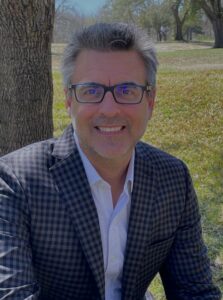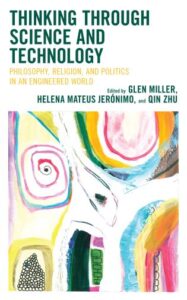Illuminating Humanities: Dr. Glen Miller

Dr. Glen Miller, Instructional Professor, 2023-24 Glasscock Undergraduate Summer Scholar Director, Departments of Philosophy and History, Texas A&M
The Glasscock Center is excited to continue this series that highlights humanities research at Texas A&M, as well as the vital role played by the humanities beyond the academy. For this highlight, we invite Dr. Glen Miller (PHIL) to tell us about his experience as a faculty director for the Glasscock Center’s Undergraduate Summer Scholar (UGSS) program.
Dr. Glen Miller is an Instructional Professor in the Philosophy & Humanities Department and a Cybersecurity Center Fellow at Texas A&M University. His most recent book, a co-edited volume titled Thinking through Science and Technology: Philosophy, Religion, and Politics in an Engineered World (available here), critically examines the forces that shape the advancement of science, technology, and engineering, and explores how these changes impact the human condition. Dr. Miller is also spearheading his department’s development of an Ethics of Artificial Intelligence Course, supported by a grant from the National Humanities Center’s “Responsible Artificial Intelligence Curriculum Design Project.”
Dr. Miller’s Undergraduate Summer Scholar seminar, Ethics and Politics of Artificial Intelligence, critically examines the social, ethical, epistemological, and legal ramifications of various forms of Artificial Intelligence (AI). As faculty director, Dr. Miller provides mentorship to undergraduate students as they develop a proposal for submission to the LAUNCH Undergraduate Research Scholars thesis program. Dr. Miller encourages students to chart their own research trajectories, to use what he has taught them as a departure point, not the terminus, noting, “I am doing my job when my students’ research extends beyond what I know.”

The cover of Dr. Miller’s most recent book, a co-edited volume titled Thinking through Science and Technology: Philosophy, Religion, and Politics in an Engineered World
The program gave Dr. Miller the time and resources he needed to get to work individually with motivated students on a topic that matters to them. Typically he teaches a large course in engineering ethics and a 25 person course in ethics in the digital age. The seminar gave Dr. Miller an opportunity to discuss ideas and evaluate the materials he was planning to use in a new course he was developing on the ethics of artificial intelligence, which debuts in the fall semester of 2023. Dr. Miller fine-tuned his curriculum by identifying areas students that caused difficulties and learning about their interests and concerns. He says of the intensive seminar period, “It helps me teach better: I start to understand where students have problems when I’m able to work closely with students over an extended period of time.”
Dr. Miller emphasizes the importance of the UGSS program for both undergraduate students and faculty because it provides a unique opportunity to collaborate on research projects. “To ensure that our students are well-rounded, we need institutional support for efforts like these, which assist professors in receiving funding and recognition for the time they commit to projects such as this,” Dr. Miller says. “There aren’t many funding options available for undergraduate research.” However, the benefits of involving students in research do not only accrue to students. “[Students] are a joy to work with because they’re energetic, they’re curious, and they have new ways of thinking about the world,” explains Dr. Miller. Moreover, these project align with the mission of the university as well. “[T]eaching students how to do research is part of the future of what the university should be doing, and our undergraduates are ready to do the research.”
In Dr. Miller’s opinion, humanities research encourages students to become better thinkers, writers, researchers, and, ultimately, better citizens. “The point of university is not simply to create talented, skilled workers,” but “to create independent citizens who are able to understand and thoughtfully act in their communities, their workplaces, and the other organizations to which they belong.”
Dr. Miller’s experience as a faculty director has been overwhelmingly positive; a sentiment echoed by the students in his seminar. His ability to create a community fostered a space for growth and exploration. “It’s absolutely a community, a reciprocal community, where they work, learn something, ask questions, and I work, learn something, ask questions,” Dr. Miller says. “…a lot of times I learned from them and they learned from me and that’s part of the goal.”
